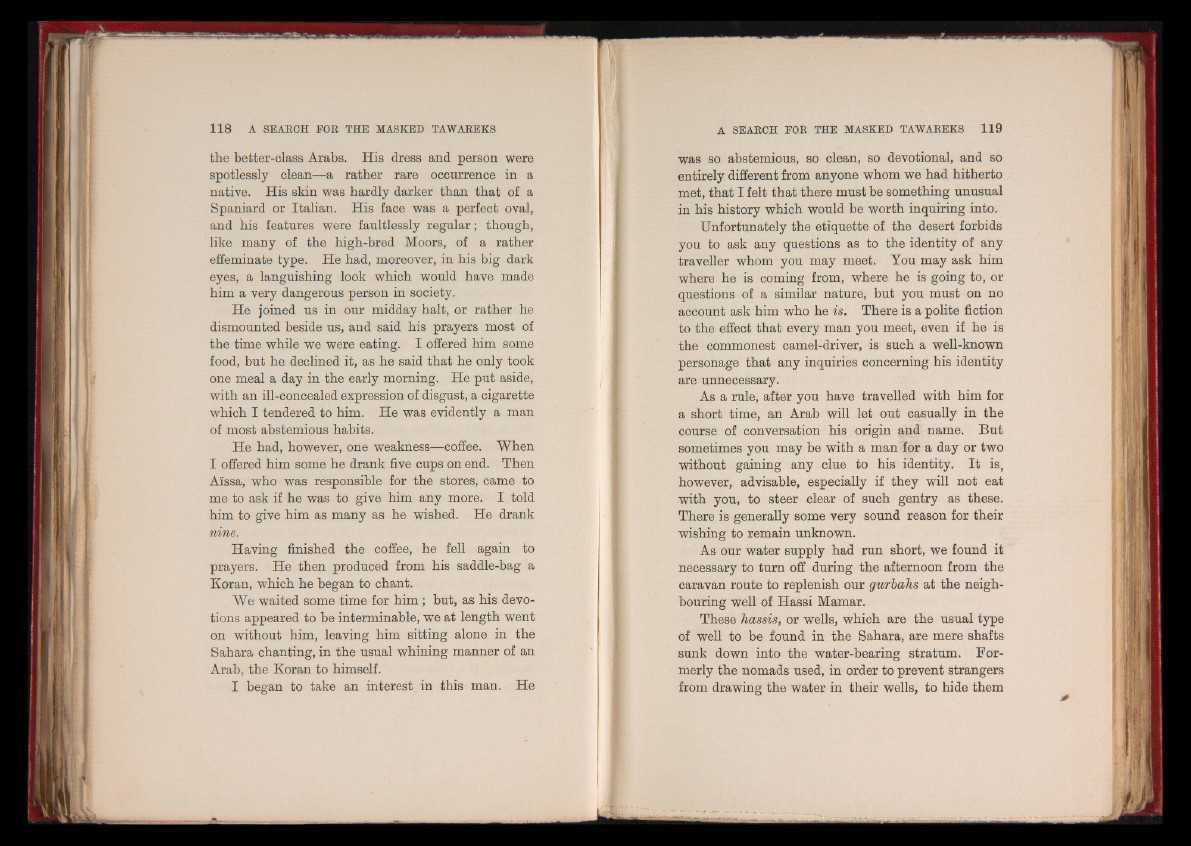
the better-class Arabs. His dress and person were
spotlessly clean—a rather rare occurrence in a
native. His skin was hardly darker than that of a
Spaniard or Italian. His face was a perfect oval,
and his features were faultlessly regular; though,
like many of the high-bred Moors, of a rather
effeminate type. He had, moreover, in his big dark
eyes, a languishing look which would have made
him a very dangerous person in society.
He joined us in our midday halt, or rather he
dismounted beside us, and said his prayers most of
the time while we were eating. I offered him some
food, but he declined it, as he said that he only took
one meal a day in the early morning. He put aside,
with an ill-concealed expression of disgust, a cigarette
which I tendered to him. He was evidently a man
of most abstemious habits.
He had, however, one weakness—coffee. When
I offered him some he drank five cups on end. Then
A'issa, who was responsible for the stores, came to
me to ask if he was to give him any more. I told
him to give him as many as he wished. He drank
nine.
Having finished the coffee, he fell again to
prayers. He then produced from his saddle-bag a
Koran, which he began to chant.
We waited some time for him ; but, as his devotions
appeared to be interminable, we at length went
on without him, leaving him sitting alone in the
Sahara chanting, in the usual whining manner of an
Arab, the Koran to himself.
I began to take an interest in this man. He
was so abstemious, so clean, so devotional, and so
entirely different from anyone whom we had hitherto
met, that I felt that there must be something unusual
in his history which would be worth inquiring into.
Unfortunately the etiquette of the desert forbids
you to ask any questions as to the identity of any
traveller whom you may meet. You may ask him
where he is coming from, where he is going to, or
questions of a similar nature, but you must on no
account ask him who he is. There is a polite fiction
to the effect that every man you meet, even if he is
the commonest camel-driver, is such a well-known
personage that any inquiries concerning his identity
are unnecessary.
As a rule, after you have travelled with him for
a short time, an Arab will let out casually in the
course of conversation his origin and name. But
sometimes you may be with a man for a day or two
without gaining any clue to his identity. It is,
however, advisable, especially if they will not eat
with you, to steer clear of such gentry as these.
There is generally some very sound reason for their
wishing to remain unknown.
As our water supply had run short, we found it
necessary to turn off during the afternoon from the
caravan route to replenish our gurbahs at the neighbouring
well of Hassi Mamar.
These hassis, or wells, which are the usual type
of well to be found in the Sahara, are mere shafts
sunk down into the water-bearing stratum. Formerly
the nomads used, in order to prevent strangers
from drawing the water in their wells, to hide them